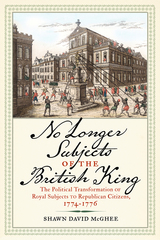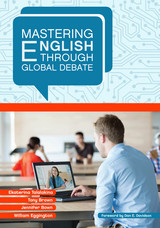
eTextbooks are now available through VitalSource.com!
Mastering English through Global Debate brings together rhetorical traditions and the best practices of ESL instruction to facilitate superior-level proficiency in the English language. Each chapter addresses a rich topic of debate, providing students with a set of prereading activities, texts covering both sides of a debate topic, and postreading comprehension and lexical development exercises—all of which foster the language and critical thinking skills needed for successful debates. A rhetorical methods section in each chapter integrates language and practice and prepares students for end-of-chapter debates. Using debate to develop advanced competency in a second language is a method that is finding increased interest among instructors and students alike, in both synchronous online teaching and the individual classroom. Students are prepared to participate fully in debates with their classmates—at home, abroad, or both.
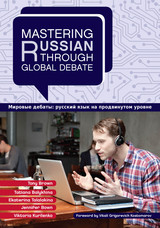
eTextbooks are now available through VitalSource.com!
Mastering Russian through Global Debate brings together the rhetorical traditions of the communications field and the best practices of adult second-language instruction to facilitate Superior-level proficiency in the Russian language. Each chapter addresses a rich topic of debate, providing students with a set of prereading activities, texts covering both sides of a debate topic, and continues with postreading comprehension and lexical development exercises—all of which foster the language and critical thinking skills needed for successful debates. A rhetorical methods section in each chapter integrates language and practice and prepares students for end-of-chapter debates. Using debate to develop advanced competency in a second language is a method that is finding increased interest among instructors and students alike, in both synchronous online teaching and the individual classroom. Students are prepared to participate fully in debates with their classmates—at home, abroad, or both.
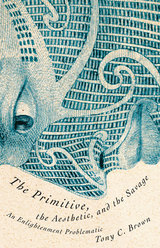
Tony C. Brown examines “the inescapable yet infinitely troubling figure of the not-quite-nothing” in Enlightenment attempts to think about the aesthetic and the savage. The various texts Brown considers—including the writings of Addison, Rousseau, Kant, and Defoe—turn to exotic figures in order to delimit the aesthetic, and to aesthetics in order to comprehend the savage.
In his intriguing exploration Brown discovers that the primitive introduces into the aesthetic and the savage an element that proves necessary yet difficult to conceive. At its most profound, Brown explains, this element engenders a loss of confidence in one’s ability to understand the human’s relation to itself and to the world. That loss of confidence—what Brown refers to as a breach in anthropological security—traces to an inability to maintain a sense of self in the face of the New World. Demonstrating the impact of the primitive on the aesthetic and the savage, he shows how the eighteenth-century writers he focuses on struggle to define the human’s place in the world. As Brown explains, these authors go back again and again to “exotic” examples from the New World—such as Indian burial mounds and Maori tattooing practice—making them so ubiquitous that they come to underwrite, even produce, philosophy and aesthetics.
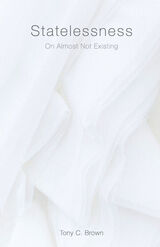
A pathbreaking new genealogy of statelessness
Just as the modern state and the citizenship associated with it are commonly thought of as a European invention, so too is citizenship’s negation in the form of twentieth-century diaspora and statelessness. Statelessness sets forth a new genealogy, suggesting that Europe first encountered mass statelessness neither inside its own borders nor during the twentieth century, as Hannah Arendt so influentially claimed, but outside of itself—in the New World, several hundred years earlier.
Through close readings of political philosophers from Hobbes to Rousseau to Kant, Tony C. Brown argues that statelessness became a central problem for political thought early on, with far-reaching implications for thinking both on the state and on being human. What Europeans thought they saw among the “savages” of the Americas was life without political order, life less than human. Lacking almost everything those deemed clearly human had achieved, the stateless existed in a radically precarious, almost inhuman privation.
And yet this existence also raised the unsettling possibility that state-based existence may not be inevitable, necessary, or even ideal. This possibility, as Brown shows, prompts the response—as defensive as it was aggressive—that we call Enlightenment political philosophy, which arguably still orders much thinking on being stateless today, including our discourses concerning migrants and Indigenous peoples.

Using debate to develop advanced competency in a second language is a method that is finding increased interest among instructors and students alike, whether in synchronous online teaching or the individual classroom. Through debate, students learn how to make hypotheses, support their conclusions with evidence, and deploy the rhetoric of persuasion in the target language. Though this method provides an exciting pedagogy for moving students from the advanced to the superior level, there is a paucity of materials available for instructors who wish to plan a curriculum focused on debate. Teaching Advanced Language Skills through Global Debate: Theory and Practice provides teachers with both the theoretical underpinnings for using debate in the foreign language classroom as well as practical advice for developing reading, listening, writing, and speaking skills through debate. It discusses task-based language learning and helps instructors design debate-related tasks for the classroom.
Teaching Advanced Language Skills through Global Debate will be useful for any instructor working at the advanced level, and particularly for those training future language instructors. One of the new digital short publications available through Georgetown University Press, it is an ideal complement to the press’s new titles on mastering languages through global debate.
Georgetown Digital Shorts—longer than an article, shorter than a book—deliver timely works of peer-reviewed scholarship in a fast-paced, agile environment. They present new ideas and original texts that are easily and widely available to students, scholars, libraries, and general readers.
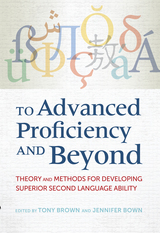
To Advanced Proficiency and Beyond: Theory and Methods for Developing Superior Second Language Ability addresses an important issue in Second Language Acquisition—how to help learners progress from Intermediate and Advanced proficiency to Superior and beyond. Due to the pressures of globalization, American society encounters an ever-increasing demand for speakers with advanced language abilities. This volume makes available cutting edge research on working memory and cognition and empirical studies of effective teaching. In addition it can serve as a practical handbook for seasoned and pre-professional instructors alike. The bringing together of the latest in second language acquisition theory, decades of empirical research, and practical classroom application makes for an unprecedented volume examining the achievement of Superior-level foreign language proficiency.
READERS
Browse our collection.
PUBLISHERS
See BiblioVault's publisher services.
STUDENT SERVICES
Files for college accessibility offices.
UChicago Accessibility Resources
home | accessibility | search | about | contact us
BiblioVault ® 2001 - 2024
The University of Chicago Press


